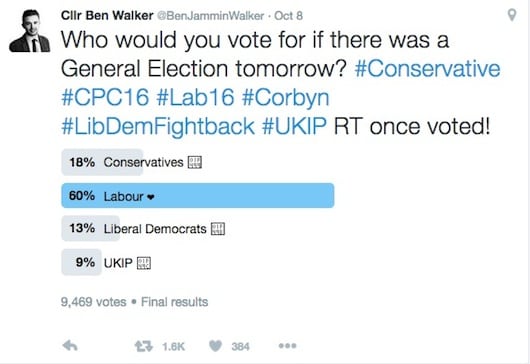What also isn't good is the coincident circulation of this. It got wide traction a week ago, and found itself bandied about again, as if in some way it invalidates the polls above.

A story. When I was tucked away in Stoke-on-Trent Central's constituency office, I remember an email from an opponent to equal marriage. The author, who regularly sent in evangelical Christian missives, urged the boss to vote against the bill went it came before the Commons. She claimed there was a majority against because a 600,000 signature position (or thereabouts) had got handed in. The polls showing consistent support for a change in the law were wrong because they were based on asking much smaller numbers of people.
Exactly the same logic is on display above. Because some 9,500 participated in Cllr Ben Walker's poll, that means it's more valid than anything our professional pollsters put out. And, oh look, the originator is a Tory councillor so the 60% rating for Labour can't be wrong.
If you're someone who fell for this, this is why you shouldn't. Polling isn't an exact science (in fact, it's not even a science), and they nearly all got the general election and EU referendum results wrong. Wrong, but close. This was because the sample sizes they worked with were weighted to match the voting population. If, for example, men are slightly more likely to vote in elections than women then those proportions will be reflected in the sample. And so on for other demographic characteristics. The sample therefore is more or less a microcosm of what Britain's electorate look like.
The poll represents no one but the people who decided to take part in it. It's an elective poll, not a weighted one. And the problem in this context is it peddles a myth, a fairy tale that everything is fine and the polls are covering up Jeremy Corbyn's massive levels of support. The task is not to hide from reality. If one is truly a radical, it must be confronted.
3 comments:
Phil, The polls are dreadful and they all point the same way - Labour is in for a serious hammering under Corbyn, who I think is a terrible liability and it seems large sections of the voters agree.
I'd be interested to hear your views on how that might be turned around. Now I accept that Corbyn is not the only thing wrong with the party, and that anyone leading it would face an uphill task.
Nonetheless, we are where we are and the members and supporters have made their preference clear, so how do we win, or even lose gallantly, under a leader who is very obviously lacking in widespread appeal?
Steve
I'm not sure exactly what your point is?
If it's just that the polls look bad for Labour at the moment, then it is not surprising given that the party has been utterly dysfunctional since June, and probably for a while before, and that the Tories have managed to shelve their European problem for a short time.
I'm sceptical about polls that are banded about as if they speak for themselves. If 'something' needs to be done, then let's hear the 'remedy'.
Steve,
General election outcomes are not principally determined by the personal popularity of party leaders, but by how well things are going under the incumbent governing party (or parties in the case of a coalition) and how well-placed the main opposition is to capitalise on any disasters that occur. As far as the next general election goes, I don't think it's too difficult to foresee potentially fatal upsets for the Tories between now and the next GE. For a start, there's the Brexit issue. There is already economic turmoil going on as a consequence of the climate of uncertainty generated by the lack of clarity as to what our economic relationship with the EU will look like post Brexit. This is putting the Tories' reputation for trustworthiness with the economy at risk. Eventually, one of two things looks set to happen. Either we end up going for a 'hard' Brexit, withdrawing from the single market and committing a tremendous act of economic self-harm that will destroy the Tories' credentials on economic competence, or Theresa May is seen to be dragging her feet over triggering Article 50, incurring the wrath of the anti-EU faction of the Tory party and causing a civil war within the parliamentary Tory party over Europe (again!). On top of this, there is the ongoing investigation into Tory electoral fraud at the last GE, which is another potential ticking time bomb for the Tories.
Against this backdrop, I think there is every chance that Labour will be able to turn its presently diabolical polling around, provided (and this is, of course, a big 'if') that it puts its recent infighting behind it* and pulls itself together. I don't necessarily see Labour winning an overall majority, as that would require that it either wins back a substantial proportion of the 40 seats in Scotland that it lost to the SNP or wins enough Tory-Labour marginals to attain a victory almost entirely on the back of English and Welsh support, neither of which seems feasible. On the other hand, I do think that, if Labour gets its act together, it can easily end up being the largest party in parliament after the next GE and thus in a position to head the next government.
*I think Labour's current polling position should be seen as an indictment not on Jeremy Corbyn, but on the hopelessly divided state of the party and on the farcical spectacle of litigation on both sides in the civil war. As Igor said, it's small wonder that Labour's ratings are down the toilet in the wake of everything that's happened in recent months.
Post a Comment